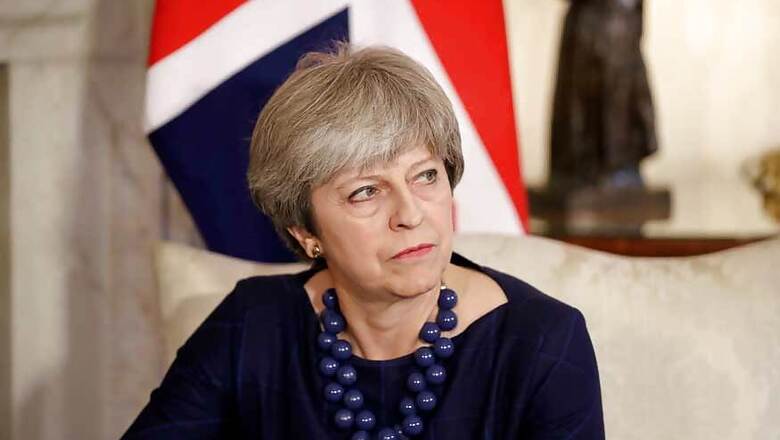
views
London: Prime Minister Theresa May cautioned rebels in her party that unless they support her potential Brexit deal with the EU then they will face a potentially disorderly "no-deal" exit that the IMF said would make the United Kingdom significantly poorer.
The United Kingdom is due to leave the EU on March 29 and yet little is clear: There is, so far, no full exit agreement and some rebels in May's Conservative Party have threatened to vote down a deal if she clinches one.
"I think that the alternative to that will be having no deal," May told BBC TV.
The fate of May's government and her Brexit plan is in doubt because it is unclear whether she could command the 320 votes she needs in the House of Commons, the lower house of the British parliament, to approve a deal.
May said that if she got a deal, she thought parliament would ultimately approve it.
Recent signals from Brussels have buoyed hopes that the United Kingdom and the EU can agree and approve a proper divorce agreement before the UK leaves, though the sides are still divided on about one fifth of the detail of a deal.
But many business chiefs and investors fear politics could scupper an agreement, thrusting the world's fifth largest economy into a "no-deal" Brexit that they say would weaken the West, spook financial markets and block the arteries of trade.
As Britain now faces a choice between a bad Brexit deal or a damaging "no-deal" Brexit, voters should be given another referendum, London mayor Sadiq Khan said.
DISORDERLY BREXIT?
With May's plans in doubt, many British ministers have outlined the damage that they say a disorderly "no-deal" Brexit would do to the British economy and its reputation as a politically stable haven for investment.
The International Monetary Fund Managing Director Christine Lagarde warned failure to get a deal would make the economy shrink. The economy will grow around 1.5 percent this year, the IMF said.
"I very much hope and pray that there will be a deal between the European Union and the UK," she told reporters. Finance minister Philip Hammond said the government should heed the warning from the IMF.
Supporters of Brexit, who admit there may be some short term instability, say British ministers and business chiefs are spreading scare stories about the impact of a "no-deal" in an attempt to rally support behind May's plans.
May's former foreign minister, Boris Johnson, attacked May's Brexit plans, known as Chequers after the country house where they were hashed out in July, as a "political car crash".
"The whole thing is a constitutional abomination, and if Chequers were adopted it would mean that for the first time since 1066 our leaders were deliberately acquiescing in foreign rule," Johnson said, referring to the 11th Century invasion which established Norman rule over England.
Johnson scolded May for her handling of the Brexit negotiations on the future of the border between Northern Ireland and the Irish Republic, the only land border between the EU and the United Kingdom after Brexit.
The Times newspaper reported that the EU's chief negotiator, Michel Barnier, is working on a new protocol text outlining how to use technology to minimise checks on the border.
Under the EU plan, goods could be tracked using barcodes on shipping containers under "trusted-trader" schemes administered by registered companies, the Times reported
Johnson said on Monday an EU technical fix could allow a proper Brexit deal to be clinched.
Reuters reported on Sept. 12 that EU officials were working on a sensitive Irish protocol to the draft Brexit treaty with Britain, as part of what Barnier has called efforts to "de-dramatise" the issue and get a deal.



















Comments
0 comment